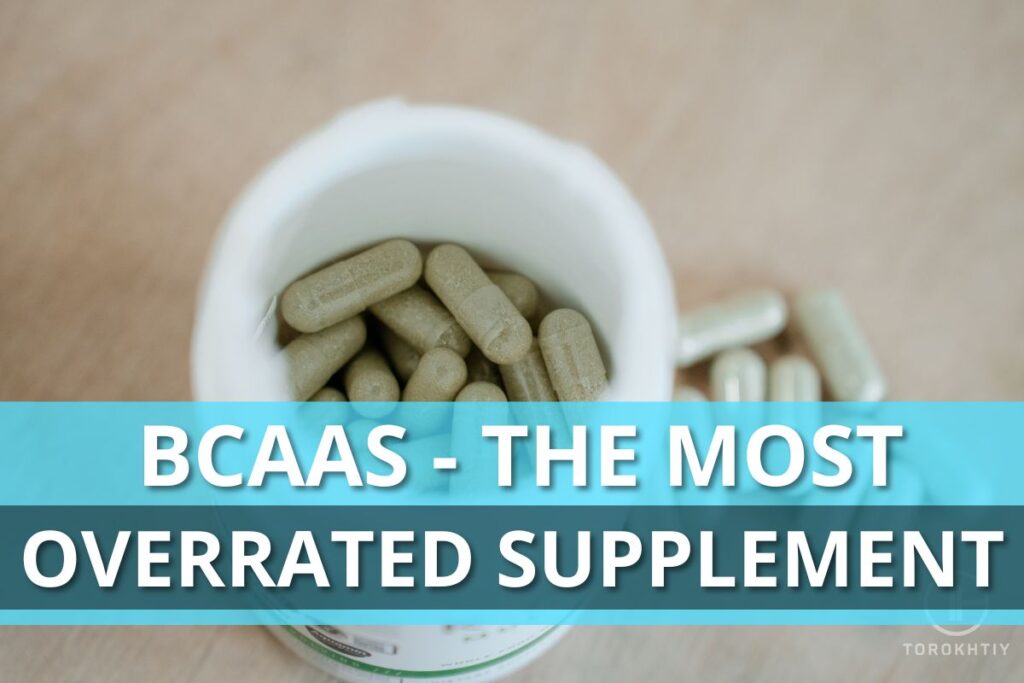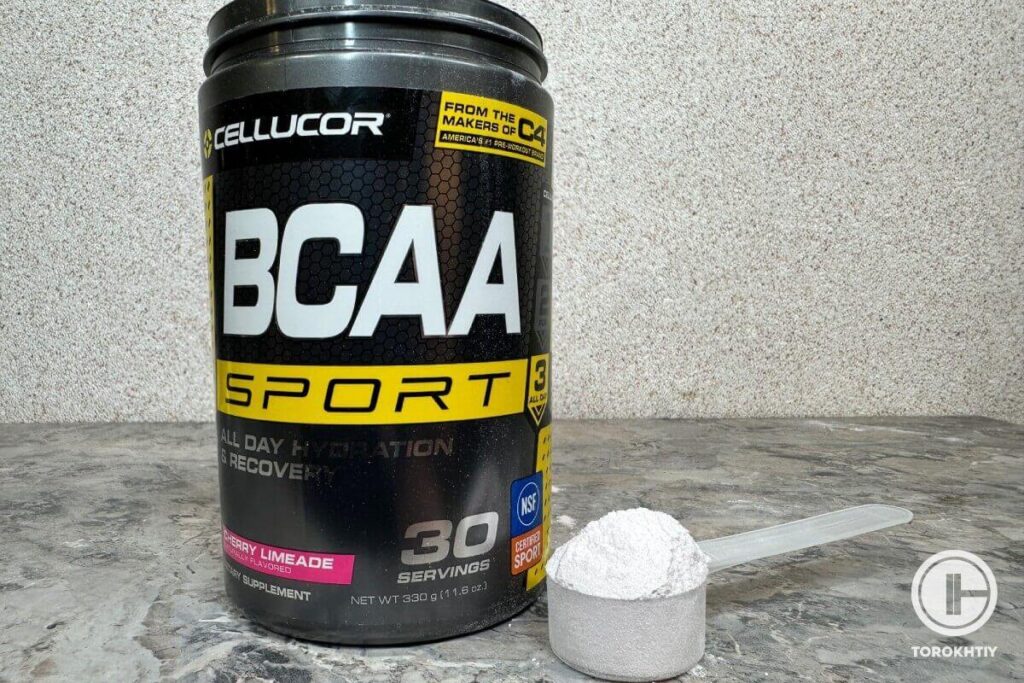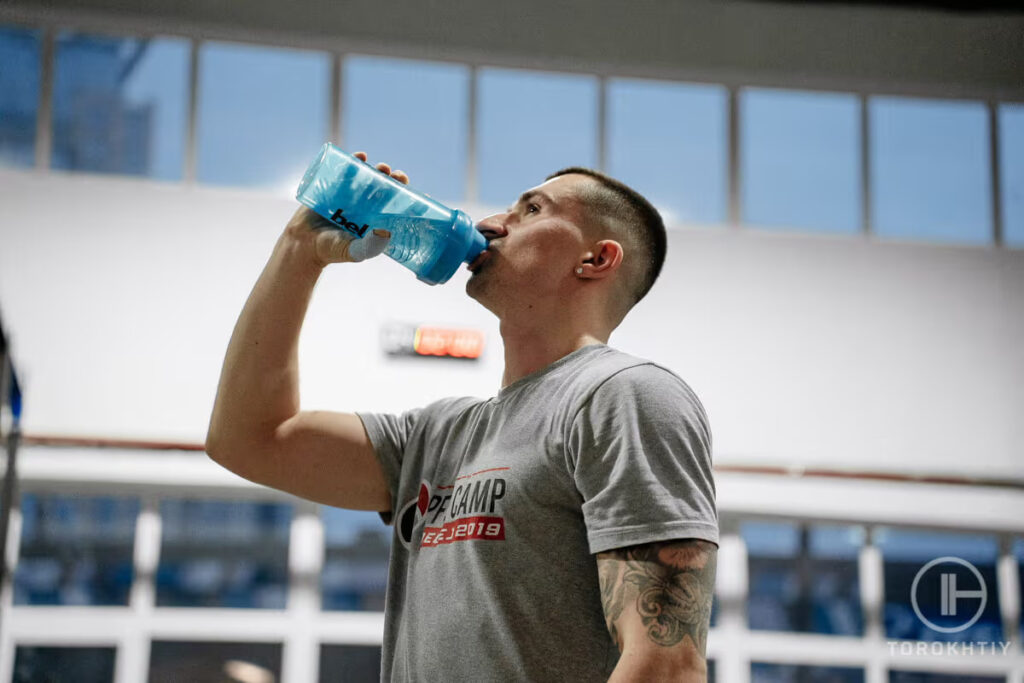BCAAs – the most overrated supplement
Author:
Unlock your full potential by engaging with our experts and community! Have questions about your fitness journey or looking for expert advice on weightlifting techniques? Don’t hesitate — leave a comment below and Sergii Putsov will provide a personalized answer and insights to help you reach your goals.
Torokhtiy is reader-supported. Some links are affiliate links, and we may earn a commission at no extra cost to you. See our disclosure page for details.

Leucine, isoleucine and valine are called BCAAs – branched-chain amino acids, as they are the only ones of amino acids that possess a side chain with a branch (it’s all about their chemical structure). They are essential amino acids contained in muscle tissue in large quantities.
Taking into consideration the importance of these essential amino acids (especially leucine) for skeletal muscles and their growth it’s no wonder why BCAAs constitute one of the most popular sports supplements. However, for a majority of people, BCAAs are just another way to spend more of their money on sports nutrition.
What’s wrong with BCAAs?
In terms of physiology and biochemistry, there are plenty of explanations concerning BCAAs potential efficiency. Yet there are no convincing scientific data about the benefits of BCAAs intake provided that a sufficient quantity of protein is being consumed.
Indeed, these essential amino acids, especially leucine, are crucial for muscle growth. However, we can’t expect our muscles and strength to grow without the other 6 essential amino acids. If you consider our body to be an orchestra, then we need all 9 musicians to play well, one conductor (leucine) and two assistants are far from being enough.
You may like it:
As it is said before, there were no studies to prove the BCAAs efficiency under the condition of covered protein demand. The majority of studies that demonstrated BCAAs efficiency were carried out on rodents and some human studies had sports nutrition manufacturers sponsorship.
However, one study showed a short-term boost of muscle protein after BCAAs intake. But after the comparison of participants in a group consuming BCAAs with one consuming whey protein, muscle synthesis proved to be significantly higher in participants that consumed whey protein (that also contains BCAAs). Remember the orchestra and musicians analogy that we’ve mentioned before? Here is the best evidence.

There are too many theoretical explanations and speculations around BCAAs, but no endpoint data that confirm muscle mass and strength growth. And this is exactly what you should be interested in under real-life circumstances.
There is also no evidence that BCAAs intake somehow helps you to preserve muscles under the calorie deficit. In fact taking BCAAs may even harm you. For example, an important issue was discussed in the Journal of the International Society of Sports Nutrition (ISSN) 2017 review. It concerns the situation that occurs under the condition of consuming only BCAAs and having other essential amino acids deficiency – in this case, the absent amino acids are extracted from muscle tissue. This is related to the fact that all 9 essential amino acids are required for muscle protein synthesis. They can’t be produced by our body, so muscle protein becomes a sole source for all lacking amino acids when you take only BCAAs.
Food is №1
One important fact is frequently overlooked when discussing BCAAs – common food products like fish, poultry, red meat and eggs also contain BCAAs. And these BCAAs are often more than enough to satisfy the demands of our body and optimize muscle and strength growth.
With mixed nutrition of food products and economically viable supplements (like whey protein) BCAAs constitute about 15-20% of the total protein amount. There are 15-20 g of BCAAs for every 100 g of protein. If you eat 170 g of protein daily, then 25-34 g of it are branched-chain amino acids. Whey protein, by the way, accounts for 25% of BCAAs. One serving of protein shake will provide you with all the essential amino acids.

Ever heard of the «leucine threshold» term? It stands for maximal stimulation of muscle protein synthesis (muscle growth) which peaks when you consume approx. 3 g of leucine with 1 meal. The following products contain such leucine amount:
- 110 g of cooked beef;
- 120 g of cooked chicken and turkey breast;
- 120 g of cooked pork;
- 140 g of salmon;
- 1 can of tuna (5 oz);
- 160-200 g of cooked lean fish;
- 160 g of dry beans;
- 80 g of parmesan or 95 g of gruyere cheeses;
- 120 g of edam or gouda cheeses;
- 140 g of mozzarella cheese;
- 250 g of cottage cheese;
- 2.5 chicken eggs;
As you see, you can get 3 g of leucine from food without additional leucine supplements, whether this is BCAAs or isolated leucine. Especially considering the fact that we eat not only fish or cheese. We also receive part of these amino acids from other components of mixed food, for example, grains or pulses. If you have eaten 130 g of fish and 150 g of boiled lentils in one meal it means that you had a sufficient amount of BCAAs and leucine.
By the way, whey protein supplements contain a protein called lactoferrin, immunoglobulin and other substances that BCAAs supplements lack. They have a very real possibility to provide additional benefits for our muscles and health. Whole protein food products also have very good satiating properties!
The International Society of Sports Nutrition (ISSN) does not recommend using BCAAs supplements to enhance muscle protein synthesis in the respect that there is no strong evidence of their efficiency.
The general scientific consensus is the following: eat an adequate amount of high-quality protein (1,6-2 g of protein per 1 kg of body mass) from food products, allocate it in roughly equal portions and consume it evenly every 3-4 hours. In this case, you will receive all essential amino acids including BCAAs in required quantities.
Who can benefit from BCAAs?
We can’t claim that BCAAs are useless in 100% of cases. BCAAs intake can provide a positive impact on muscle protein synthesis if you stick to a vegan diet. In this case, you should take BCAAs together with the meal so that all 9 essential amino acids would be in your blood in sufficient amounts simultaneously. BCAAs are also good for master athletes that suffer from anabolic resistance phenomenon. Additional BCAAs intake can “break through” this resistance and result in muscle protein synthesis increase.
Related articles:
You might be interested in:
Why Trust Us?
With over 20 years in Olympic weightlifting, strength training, nutrition coaching, and general fitness our team does its best to provide the audience with ultimate support and meet the needs and requirements of advanced athletes and professional lifters, as well as people who strive to open new opportunities and develop their physical capabilities with us.
By trusting the recommendations of our certified experts in coaching, nutrition, and sports training programming, as well as scientific consultants, and physiotherapists, we provide you with thorough, well-considered, and scientifically proven content. All the information given in the articles concerning workout programming, separate exercises, and athletic performance, in general, is based on verified data.
The product testing process is described in more detail here.
Author: Sergii Putsov
Head of Sport Science, PhD
Best Results: Snatch – 165 kg,
C&J – 200 kg
Sergii Putsov, Ph.D., is a former professional weightlifter and National team member, achieving multiple medals in the 94 kg weight category at national competitions. With a Master’s degree in “Olympic & Professional Sport Training” and a Sport Science Ph.D. from the International Olympic Academy, Greece, Sergii now leads as the Head of Sport Science. He specializes in designing training programs, writing insightful blog articles, providing live commentary at international weightlifting events, and conducting educational seminars worldwide alongside Olympic weightlifting expert Oleksiy Torokhtiy.




Still have questions after reading our article? Unlock your full potential by engaging with our experts and community! Don’t hesitate — leave a comment below and Sergii Putsov will provide a personalized answer and insights to help you reach your goals.